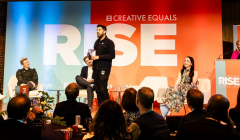
Are we leaving men and boys behind?
At Creative Equal’s RISE event, industry leaders consider how to reframe boys and men in marketing

Dentsu Creative’s 2023 Trends Report Examines an Era of ‘Mental Health in Crisis’

Each year agencies unite the minds of their talent to deduce, based on the current state of the world, what exciting new trends will shape the year ahead. However, this year, crafting our DENTSU CREATIVE trends report felt a little different. We realized 2023 will dance on the fine line between progression and regression, fear and confidence, threat and opportunity. "A Tale of New Cities" was our attempt to interpret this duality and help brands embrace it, so they can hopefully contribute not detract from our society in 2023.
A compelling trend was uncovered in the realm of the mind, where rising anxiety levels fueled by a bleak economic outlook are powering a worldwide mental health crisis. It’s important to note, however, that this crisis long predates the current economy and even the pandemic. The pandemic merely surfaced it, the uncertain economic outlook exacerbated it, and now, everyone has no choice but to respond.
As technology attempts to support a healthy mind, the stigma around mental health is breaking down worldwide through greater debate and representation in media.
Giulietta Vento, Integrated Strategist, Dentsu Creative
Indeed, a first response came in the form of “quiet quitting.” In March 2022, Gen Z and millennial employees began to reject hustle culture and the idea of “going above and beyond” at work. Young employees were seeing their wages stagnate while the cost-of-living sky-rocketed and realized sacrificing their mental health for work was no longer “worth it.” As a result, 2022 saw employers prioritize employee well-being as a strategic imperative, which will continue in 2023. Goldman Sachs moved to unlimited PTO to signal their care for employee health, while companies attempting the four-day work week saw 67% of employees feeling less burned-out and reported resounding success in productivity.
As employee well-being becomes a top priority the deluge of mental health apps that flooded the market pre-pandemic are pivoting strategies. They are targeting employers, who pay a fee for employee access, over individual patients. Headspace Health, for instance, rolled out a new corporate product experience that brings together meditation and on-demand therapy. The integrated app makes it easier for employees to access support and reduces complexity and administrative burden for employers. Ami, a mental health startup and Meta’s first investment in Asia, aims to make mental healthcare more accessible for employees through counseling sessions on messaging platforms like WhatsApp.
As technology attempts to support a healthy mind, the stigma around mental health is breaking down worldwide through greater debate and representation in media. In the West, celebrities like Selena Gomez and Jonah Hill opened up about mental health in their respective documentaries, normalizing vulnerability as a strength and powerful tool for self-acceptance. In the East, the Netflix series “Extraordinary Attorney Woo” made a first attempt to bring attention to autism in South Korea. Some argued that a stereotypical depiction of disability inspires further narrowmindedness, however, autistic viewers themselves finally felt represented. Both instances signal a global shift in the larger mental health conversation at a time when it is needed the most.
More and more consumers will be looking to brands they can trust for support. From brands, consumers will appreciate care whose primary objective is not sales or self-interest. They will turn away from apathy or tokenistic support and towards a sense of authentic validation.
For example, as consumers seek to deduce what makes them tick and where they should put their energy they are looking to personality diagnostics to help them hack their wellbeing. Brands can lean into AI to analyze consumer behaviour and offer insights and practical advice based on their personalities or actions, even creating special social media moments like Spotify’s End of Year Wrapped.
Or, in another instance, consumers are finding comfort and support in pocket therapy. The group-therapy app Chill Pill offers a “world of future friends and better days” but does not permit the sharing of any personally identifying information. Brands should continue to find small moments to support consumers digitally while ensuring privacy functions match.
In an uncertain world, we sometimes turn to strange places for solace. The #CleanTok hashtag has over 62 billion views in TikTok, as Gen Z seek a sense of calm and control through watching others go through the ritual of cleaning house and restoring order. The link between a physical and emotional sense of order is well documented, with Gen Z taking things to the next level via a vicarious self-soothing. This should serve as inspiration for brands wanting to connect with their consumers, either by normalizing the practice of self-soothing in surprising ways or contributing to it in new ways.
Overall, brands that bring consumers small moments of joy, selfcare, validation, or support will gain their trust. And brands that show audiences they are not alone by reminding them it’s normal to struggle will play in rich emotional territory.
Giulietta Vento is an integrated strategist for DENTSU CREATIVE. Born and raised in Rome, she attended university in London before relocating to NYC to begin her creative strategy career. She is passionate about uncovering human insights, and defining opportunities to apply them in the realm of wellness, and guiding brands to seek an authentic way in. As a rising talent at Dentsu Creative, Giuletta was chosen to contribute to its 2023 Trends Report to provide a wide range of fresh perspectives.
Looks like you need to create a Creativebrief account to perform this action.
Create account Sign inLooks like you need to create a Creativebrief account to perform this action.
Create account Sign in